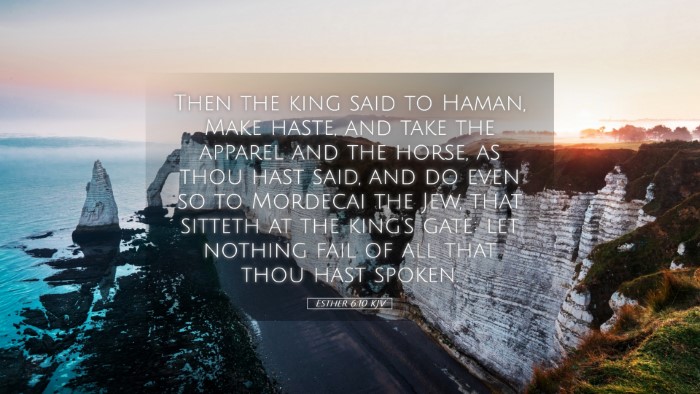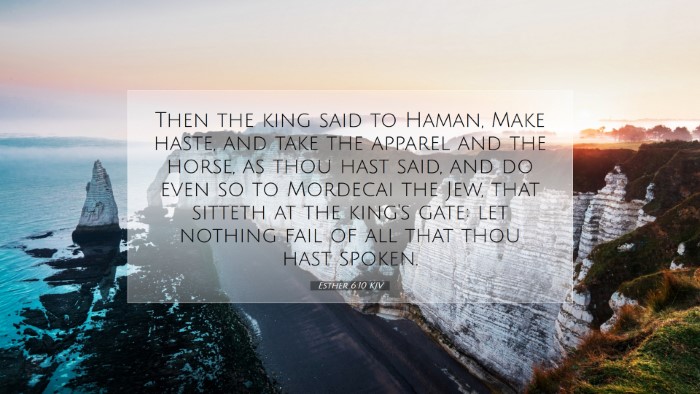Old Testament
Genesis Exodus Leviticus Numbers Deuteronomy Joshua Judges Ruth 1 Samuel 2 Samuel 1 Kings 2 Kings 1 Chronicles 2 Chronicles Ezra Nehemiah Esther Job Psalms Proverbs Ecclesiastes Song of Solomon Isaiah Jeremiah Lamentations Ezekiel Daniel Hosea Joel Amos Obadiah Jonah Micah Nahum Habakkuk Zephaniah Haggai Zechariah MalachiEsther 6:10
Esther 6:10 KJV
Then the king said to Haman, Make haste, and take the apparel and the horse, as thou hast said, and do even so to Mordecai the Jew, that sitteth at the king's gate: let nothing fail of all that thou hast spoken.
Esther 6:10 Bible Commentary
Commentary on Esther 6:10
Verse Context: Esther 6:10 states, "Then the king said to Haman, 'Hurry, take the robe and the horse, as you have said, and do so to Mordecai the Jew who sits within the king's gate. Leave out nothing that you have mentioned.'
Overview
The verse is a pivotal moment in the book of Esther, articulating a significant turn of events in the narrative. Haman's plot to annihilate the Jews has been turned upside down, and his arrogance and schemes are met with a divine reversal. This commentary seeks to explore the implications of this verse through various public domain sources, revealing theological, historical, and moral dimensions that speak to pastors, theologians, and scholars alike.
Theological Insights
This verse showcases God's sovereignty in orchestrating events for the protection of His people. The reversal of fortunes hints at the divine principle that "he who digs a pit will fall into it" (Proverbs 26:27). The irony of Haman, the very antagonist, being compelled to honor Mordecai is richly theological, emphasizing God's control over human affairs.
Examination by Matthew Henry
Matthew Henry elucidates the theme of divine providence in stark contrast to human plots. He remarks, "When men plot against God’s people, they often become instruments of their own downfall." The king's command serves as a divine decree that not only elevates Mordecai but also humiliates Haman in the very act meant to destroy the Jews. Henry's reflection resets the relationship between power and justice, assuring the faithful of God's ultimate judgment.
Analysis by Albert Barnes
Albert Barnes reflects on this verse by highlighting Haman’s psychological state. He writes, "Haman had no choice but to serve contrary to his desire. The order from the king is both a punishment and a public declaration of Mordecai's value." This analysis unveils the layers of moral complexity that lie behind Haman's predicament, suggesting that actions through malice can ultimately lead to one's disgrace. The plight of Haman must encourage readers to consider the paths they choose and the potential divine consequences that may follow.
Insights from Adam Clarke
Adam Clarke draws attention to the significance of royal robes and horses in ancient Near Eastern culture, indicating they symbolize honor and authority. He notes, "For Haman to lead Mordecai upon the king's horse, robed in royal apparel, meant that he was to proclaim beforehand his dignity and worth." Thus, the humiliation of Haman echoes throughout the Jewish community as a deliverance narrative and reestablishes their standing in the Persian Empire. Clarke emphasizes how God’s intervention uses unexpected persons to affect salvation and justice.
Literary Aspects
Esther 6:10 employs irony as a literary device, where the antagonist is compelled by the king to bestow honor upon his intended victim. This creates a compelling narrative tension and augments the dramatic reversal that is central to the story.
Symbolism
- Royal Horse and Robe: Denote authority and respect, two qualities that Haman sought to restrict from others, illustrating the absurdity of his ambitions.
- Mordecai's Rising Status: Reflects God's favor and plan in reversing fortunes amidst human scheming.
Lessons for Today
As we reflect on Esther 6:10, several key lessons emerge:
- God's Sovereignty: This text reassures us that no human plot against God's people will ultimately succeed.
- The Dangers of Pride: Haman’s pride led to his demise; it serves as a warning to all about the pitfalls of arrogance.
- Redemptive Justice: The actions of leaders carry weight; righteous leadership should honor the faithful, reflecting God's justice.
Conclusion
In summary, Esther 6:10 encapsulates themes of irony, divine justice, and the reversal of human wickedness through God’s providential care. Through the perspectives of Matthew Henry, Albert Barnes, and Adam Clarke, we discover a rich tapestry of meaning that invites us to reflect on our own lives in light of God's unfolding narrative. The nuances of this single verse resonate deeply, reminding us that God's plans cannot be thwarted and that the faithful will ultimately be vindicated.


